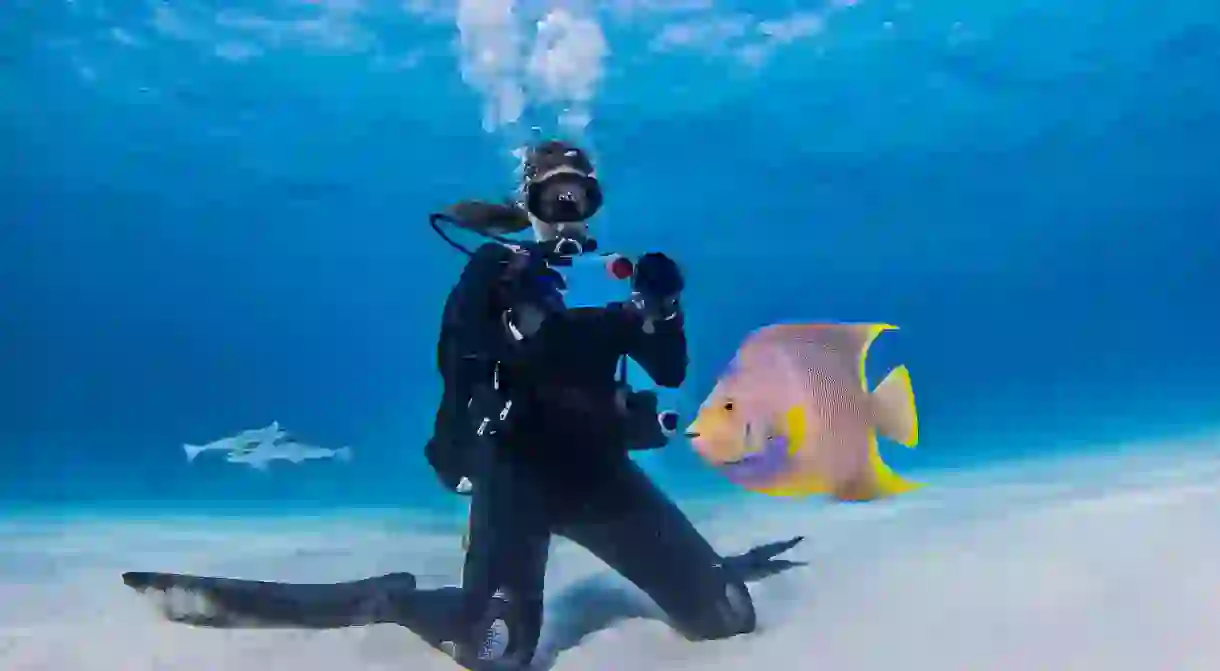In the Bahamas, You Can Swim With These Amazing Animals

With 700 islands covering over 100,000 square miles of ocean, The Bahamas is a paradise for marine life. From reef sharks to manta rays, many sea creatures flock here to breed and feed in coral reefs, creating a rich ecosystem. Want to get up close and personal with Bahamian wildlife? Here’s our guide on how to swim with these animals in a responsible way.
Eager to see the best marine life in The Bahamas? Hire a vessel for the day with SamBoat or book a multi-day sailing trip with Dream Yacht Charter.
Pigs

Ever wondered which animals live in The Bahamas? Pigs perhaps don’t immediately spring to mind. However, in recent years, visiting the swimming pigs in Exuma has become one of the region’s most popular attractions. No one is entirely sure how the pigs got there because they are not native to the island. Some say they were left there by sailors who planned to come back and cook them, or that the first set of pigs swam over from a shipwreck nearby. The best way to visit these adorable creatures is by boat. Make sure you are respectful; give them space and avoid feeding them.
Sharks

Despite their fearsome reputation, sharks are among the most threatened marine creatures on the planet. Thankfully, these graceful predators are protected in The Bahamas. Reef sharks, tiger sharks, hammerheads and nurse sharks are among the wide array that can be spotted in the balmy waters here. Head to Compass Cay to watch friendly nurses sharks swim around the marina. Scuba divers can book an excursion to Tiger Beach or Shark Junction off Grand Bahama to see larger varieties in their natural habitat. Read our responsible travel guide to swimming with shark in the Bahamas before you go.
Dolphins

Dolphin spotting ranks highly on many bucket lists. The clear waters off Bimini are the best place to see Atlantic spotted and bottlenose dolphins; watch them soar through the waves, clicking and whistling as they dart between one another. Choose a responsible tour operator that sticks to the following simple rules: never feed the dolphins, resist the urge to touch them and don’t pursue them, if you do encounter them while snorkelling – let them control the experience. Avoid visiting marine parks where dolphins are kept in captivity, as these conditions create lifelong physical and mental health issues.
Turtles

Green and hawksbill turtles are frequently glimpsed in the shallow waters of The Bahamas. These majestic creatures have a life span of up to 70 years. Coco Bay, off the appropriately named Green Turtle Cay, is a common place to spot these reptiles while swimming. Try not to kick up the sandy bottom and you’ll get the best chance of clear visibility to spot them. As with the other animals on this list, look but don’t touch.
Starfish
Starfish are one of The Bahamas’ most well-known marine animals. They have a unique anatomy – instead of blood, they pump nutrients around their bodies using seawater. If attacked by a predator, starfish will occasionally sacrifice a limb because they have the ability to grow a new one back. Look out for starfish in the shallow seagrass beds – the cushion sea star is one of the largest varieties, it can grow up to 20 inches in diameter.
Lobsters

Spiny lobsters (also known as rock lobsters) are native to The Bahamas. Unlike their cold water cousins, they have long barbed whips (rather than claws) and large tails. You’ll spot them in rock crevices and tucked away in coral reefs; sometimes they venture out at night to hunt for sea snails and urchins. Amazingly, they navigate by detecting smells and tastes in the water. If you’re lucky, you might spot a train of up to 50 lobsters marching together across the sea bed.
Queen conchs

You’ll like have seen queen conch shells scattered across the white sand beaches of The Bahamas. Queen conchs are a key part of the culture here; they even feature on the country’s coat of arms. However, few people know about the creature that inhabits it – a large sea snail that grows the shell around itself for protection. The oldest known specimens are 40 years old. Sadly, populations are fast declining due to overfishing. Keep an eye out for a queen conch while snorkelling – they live on the sandy seabed.
Fish

Hundreds of species of tropical fish live in the Bahamian waters; this is partly why it’s one of the best places for scuba diving in the West Indies. Snapper, grouper, yellowtail, barracuda and wahoo are among the critters that dwell here. Grab your snorkel and head to Rose Island Reef, a family-friendly spot where vast schools of fish swim in between two shipwrecks, the Mahoney and the Alcora. Alternatively, sail to the Fowl Cays National Park to spot groupers.
Spot marine life in the Bahamas by hiring a boat for the day through SamBoat. Alternatively, rent a yacht for a multi-day sailing trip with Dream Yacht Charter.













